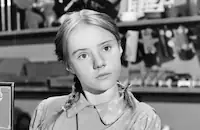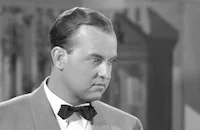In Name Only

Brief Synopsis
Cast & Crew
John Cromwell
Carole Lombard
Cary Grant
Kay Francis
Charles Coburn
Helen Vinson
Film Details
Technical Specs

Synopsis
When Alec Walker, the victim of a loveless union to a heartless woman who married him for his money and social position, meets Julie Eden and her daughter Ellen, he falls in love. Julie, a widowed commercial artist, is caring and uncomplicated, everything that Alec's wife Maida is not. However, Maida cunningly fools Alec's concerned parents into believing that she is the perfect wife, and consequently, when Alec demands a divorce, Maida consents on the condition that she sail to Paris with his parents and inform them of the divorce once they reach Europe. Alec foolishly agrees and follows Julie to New York, where he proposes to her. Over the objections of her sister Laura Morton, who has been hurt in love, Julie accepts. Julie and Alec look forward to their marriage, but Maida prolongs her stay in Europe, causing Julie much anguish. Finally returning home on Christmas Eve, Maida informs Julie that she will never grant Alec a divorce, and if he files for one, she will sue Julie for alienation of affections and drag her daughter into court to testify. Apparently defeated, Alec and Julie prepare to part when Alec contracts a severe case of life threatening pneumonia. When the doctor suggests that only the hope of a reunion with Julie can save Alec, Julie bravely approaches his sickbed and lies that Maida has agreed to a divorce. Soon after, Maida vehemently attacks Julie, and Alec's parents overhear her proclaim that she will never be satisfied with only a divorce settlement but wants all the Walker money. Exposed by her own duplicity, Maida is banished from Alec's life, thus clearing the way for his union with Julie.

Director

John Cromwell
Cast

Carole Lombard

Cary Grant

Kay Francis

Charles Coburn

Helen Vinson

Katharine Alexander

Jonathan Hale

Nella Walker

Alan Baxter
Maurice Moscovich

Peggy Ann Garner
Spencer Charters
Harriet Mathews
Sandra Morgan
Harold Miller
John Dilson
Douglas Gordon
Tony Merlo
James Adamson

Frank Puglia
Alex Pollard
Charles Coleman
Florence Wix
Katherine Wilson
Clive Morgan
Major Sam Harris

Grady Sutton
Bert Moorhouse

Byron Foulger
Arthur Aylsworth

Lloyd Ingraham
Gus Glassmire
Mary Mac Laren
Robert Strange
Jack Chapin
Harold Hoff
Allen Wood
George Rosener

Fern Emmett
Edward Fligle
John Laing
Frank Mills
Crew
Pandro S. Berman
Perry Ferguson
George Haight
William Hamilton
J. Roy Hunt
Irene
Hugh Mcdowell Jr.
Van Nest Polglase
Richard Sherman
Darrell Silvera
Dewey Starkey
Edward Stevenson
Linn Unkefer
Roy Webb

Photo Collections
Videos
Movie Clip



Film Details
Technical Specs

Articles
In Name Only
That same year, Cromwell and Lombard had worked together on Made for Each Other (1939), and Lombard had worked with Grant twice before, most notably in The Eagle and the Hawk (1933). Lombard's star was flying high ever since Twentieth Century (1934), her breakthrough film that established her as "The Queen of Screwball Comedy." She successfully negotiated the terms of her contract for In Name Only with RKO by herself, cutting out her agent Myron Selznick. Smart move: she secured a four-picture deal over two years, earning $150k per pic, but more importantly, a percentage of the earnings - standard practice today, but very novel then. Grant, hired in at half her salary, also displayed his prowess for negotiation and got a raise to $100k based on the success of Gunga Din and Only Angels Have Wings (both 1939).
Kay Francis, who soared to the ranks of leading lady at Paramount beginning with her debut alongside the Marx Brothers in The Cocoanuts (1920), was grateful just to have the opportunity to work with such high caliber talent. Once the star of films like Street of Chance and Raffles (both 1930), her star had considerably dimmed. Industry insiders proclaimed it career sabotage by her next studio, Warner Bros.--with Bette Davis as the new kid on the block, Francis was increasingly relegated to B-level flicks--but as she declared defiantly, "You can put me in B's, C's or Z's." Cromwell had directed Kay in four other films--including Street of Chance and For the Defense (1930)--and always envisioned her for the role of Grant's cruel wife. With the strain of a failing career over several years, however, Francis brought some problems with her.
From James Robert Parish's book Loretta, Ginger and Irene Who?: "Life increasingly assumed soap opera overtones. An unhappy Kay, retreated into eating and drinking binges, and her slim 112-pound figure of 1930 ballooned to 142 by 1939. She resolved to get in shape for In Name Only but only got tight and belligerent. In her cups she insulted her old friend Andy Devine and Jack Warner in a single evening. 'So what?' she asked her diary. But when she saw her wardrobe tests, she recorded that she looked 'frightening' and thereafter controlled herself long enough to lose twenty pounds." Ultimately, she was able to mount an effective comeback; the reviews for her performance were good, with New York Times film critic Bosley Crowther praising her as "the model cat, suave, superior and relentless." The Variety review, however, focused on her physical appearance, noting that "She does not photograph as well here.....unless the idea was to make her less glamorous than she has been in the past." Yowch! The review also panned the debut of child star Peggy Ann Garner, who plays Lombard's child in the film, declaring, "She has some sweetness but lacks polish, doing her lines very deliberately and suggesting that air of unnatural action which too frequently is the fault of kids following adult coaching." Garner would go on to star in the classic A Tree Grows in Brooklyn (1945), a film for which she received considerably better reviews!
In Name Only followed an extremely aggressive schedule according to the book, Screwball, "...begun in April, completed in June, edited in July, previewed in August, released in September: RKO was nothing if not expeditious." Gone with the Wind was also finishing up around the same time (albeit with three years of preparation under its belt), so young marrieds Lombard and Gable looked forward to a nice break on their own. Unfortunately, Carole was stricken with appendicitis and narrowly avoided serious complications. Tragically, she would die in a plane crash just three years later. Grant, of course, would go on to attain superstar status in the 1950s and 60s with films like To Catch a Thief (1955) and North by Northwest (1959).
Producer: George Haight
Director: John Cromwell
Screenplay: Richard Sherman, Bessie Breuer (novel)
Cinematography: J. Roy Hunt
Film Editing: William Hamilton
Art Direction: Perry Ferguson, Van Nest Polglase
Music: Roy Webb
Cast: Carole Lombard (Julie Eden), Cary Grant (Alec Walker), Kay Francis (Maida Walker), Charles Coburn (Mr. Richard Walker), Katharine Alexander (Laura Morton), Helen Vinson (Suzanne Duress).
BW-95m. Closed captioning.
by Eleanor Quin

In Name Only
Quotes
Trivia
Notes
The working titles of this film were Memory of Love, and The Kind Men Marry. It was issued its MPPDA certification number under the title Memory of Love. News items in Hollywood Reporter note that Douglas Fairbanks Jr. was originally slated to play the role of Alec Walker. The film was filmed on location at San Marino, CA. According to a letter contained in the MPAA/PCA Collection at the AMPAS Library, the Hays Office rejected the first script that RKO sent them for approval. In that script, "Alec" learns that "Julie" is pregnant and that he has only six months to live, and rather than let her suffer the pain of his death, he accuses her of blackmail and sends her away. Joseph I. Breen, director of the studio relations office of the Associated Motion Picture Producers, deemed that version unacceptable because Alec's illicit relationship with Julie is condoned and thus "undermines the sanctity of the home and the institution of marriage." The sexual affair between "Julie" and "Alec" was then toned down by the elimination of Julie's pregnancy in the released film and by substituting a happy ending in which Julie and Alec plan to wed. In 1939, the Lux Radio Theater presented a radio version of the story starring Carole Lombard and Cary Grant.














